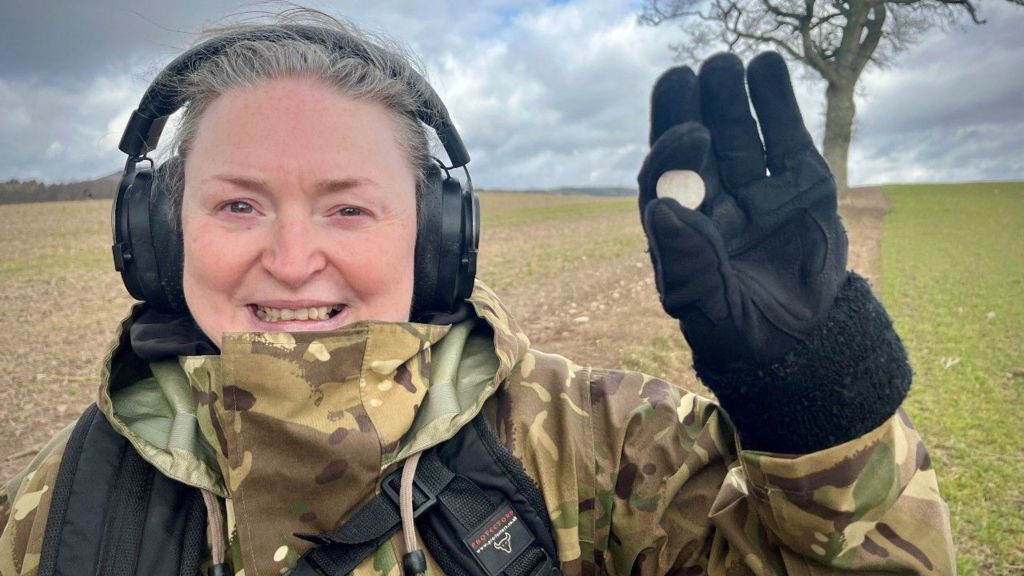Modernising the hunt for Scotland's buried treasure

Lynne Ross is a keen detectorist
- Published
Apps and new technology could modernise the search for buried treasure in Scotland, experts say.
A boom in the popularity of metal detecting has put the current Treasure Trove system under pressure, as more and more people submit their finds.
Archaeological objects found in Scotland are designated "ownerless property" by law and can be claimed by the Crown.
The Treasure Trove Unit decides whether these should be offered to museums, who then pay the finder a financial reward.
Dr Stuart Allan, who is chairing a public review into the Treasure Trove, says the Edinburgh-based unit must move with the times.
He suggests that an app could help by allowing detectorists submit finds for a quick initial assessment.
He said: “The aim is to streamline and modernise and use all the tools that are available to us - without having to compromise on the quality of the retention and assessment of archaeological information."
Recent finds in Scotland include a Mesolithic harpoon, a memento mori finger ring adorned with a human skeleton and a hoard of coins near Peebles, which could date to 1150 BC.
A group of Iron Age gold torcs found in Blair Drummond near Stirling
The National Council For Metal Detecting now has 1,600 members in Scotland, following a rise in numbers since the Covid pandemic.
There has also been an increase in amateur and professional archaeology.
Objects are also discovered by field walkers or through magnet fishing.
Even on a recent wet and windy weekend, dozens of hardy enthusiasts slowly paced back and forth across farmland in Perthshire.
They were seeking items from all periods of human activity, from prehistoric to the modern and from gold and silver objects to coin hoards.
The fields have yielded a rich bounty of finds in the past so their location is only known to detectorists who have permission to search its soil.
They told BBC Scotland News that their hobby was addictive, absorbing and a way to connect them with Scotland's past.
Phil Wilson says the hobby is like looking into history
Lynne Ross from Motherwell has been detecting since 2019 and wishes she had started earlier.
She said: "I think it's when you're growing up, you think of treasure and the adventure of it all."
Phil Wilson, a builder from Largs, says his passion has been mocked by others.
He said: "Some say it's a nerd's hobby. I say, no, you're looking into history and it's the closest you're going to get."
Colin Irvine is one of Scotland's most experienced metal detectorists
Colin Irvine, one of Scotland's most experienced detectorists, found four coins from the 14th century in the field in Perthshire.
He believes there is a need to “speed up the system”.
He explained: "Most finds get returned by the Treasure Trove Unit.
“The museums are strapped for cash and often the location where it was found is more important than the object itself.
"I'd like to see finds from 1700 onwards not included as treasure. Ninety percent of what we find is from after 1700, so it would save a lot of time."
A Mesolithic era harpoon is one of the more unusual recent finds in Scotland
The laws on financial rewards differ between Scotland and England and Wales.
Under the Scottish system, the money is given to the finder, who has usually reached a prior agreement to halve the cash with the landowner.
On rare occasions, there are disputes.
In 2019, the Church of Scotland sued for a share of a £2m Viking hoard unearthed on its land in Dumfries and Galloway.
The case was later settled out of court.
Such difficulties should not be possible in England and Wales, where the Treasure Act of 1996 stipulates that the money has to be shared between the finder and landowner, with the Treasure Valuation Committee deciding how it should be divided.
Alan Tamblyn, general secretary of the National Council For Metal Detecting said: “Handshakes are great until something goes wrong. It is important to formalise that.”
The Treasure Trove review is being carried out on behalf of the Crown’s representative in Scotland, the King’s and Lord Treasurer’s Remembrancer.
The public consultation on the review will close on 13 May.